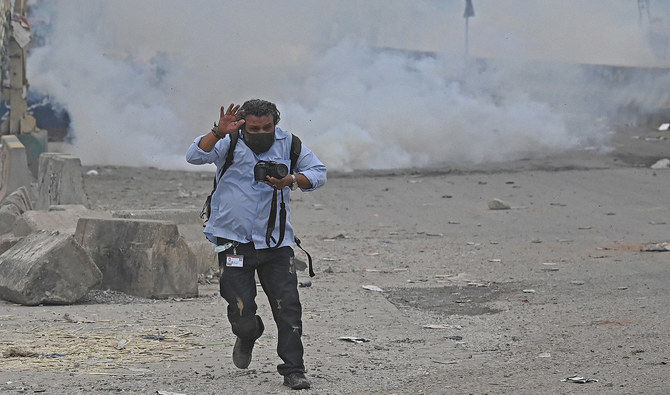ISLAMABAD: A research study has found that Pakistani journalists have been suffering from threats and mental health issues, including sleep deprivation, disturbing memories and nightmares due to their line of work.
Journalists, camerapersons and photographers in Pakistan are often found to be suffering from posttraumatic stress disorder (PTSD), especially those who report on natural disasters. They often experience higher levels of anxiety, stress or depression, which causes them to feel low on energy, experience low moods and evokes feelings of hopelessness.
“Pakistani journalists are facing mental health issues due to the topics they report on and work-related threats that they receive,” Dr Jamil Malik, an assistant professor at the National Institute of Psychology that conducted the study in collaboration with The Vrije Universiteit in The Netherlands, told Arab News on Sunday.
He said over half of the journalists who participated in the study were stalked at least once during their career, adding that the levels of depression were also “considerably elevated.”
The study found that journalists who reported more often on natural disasters suffered more severe posttraumatic stress symptoms than those who reported less often on the subject. Men and women, staffers and freelancers did not significantly differ in their mental health problems, the topics they reported on, or the threats they faced, except for kidnapping.
The research concluded that journalists working for foreign media received significantly more electronic threats and were more often detained, than those who did not work for foreign outlets. “Tragically, a third of the journalists personally knew a colleague who was murdered,” it said.
Shahzada Zulfiqar, president of the Pakistan Federal Union of Journalists (PFUJ), said it was a fact that a majority of Pakistani journalists, especially field reporters, were suffering from trauma and mental health issues due to the nature of their work.
“Pakistan isn’t a peaceful country,” he told Arab News. “Our reporters, photographers and cameramen have been covering terrorism-related incidents for the last 20 years and the impact of it on their mental health is quite obvious.”
Zulfiqar said journalists were attacked and kidnapped in the Pakistani capital of Islamabad with complete impunity and “it leaves a mental pressure and stress on the whole community.”
“Our journalists remain constantly under pressure from the government, state institutions and other powerful groups for covering stories, which they usually don’t want to get published or broadcast,” he said.
The PFUJ president urged the federal and provincial governments, and non-governmental organizations (NGOs) to set up mental health counseling centers for journalists across the country.
“It is a sad reality that the majority of our field workers don’t have enough resources to consult psychiatrists for their mental health,” he regretted.
According to a report by the World Health Organisation, mental health facilities are not readily available in Pakistan, where only one psychiatrist is available for every 100,000 people.
Sadaf Khan, the co-founder of Media Matters for Democracy non-profit organization that is providing online, free-of-cost mental health counseling services for Pakistani journalists, said journalists developed “serious mental health issues” due to their constant exposure to crime and terrorism-related incidents.
“We have noticed that some journalists do share their mental health issues with our psychologists and therapists, but a majority of them don’t return after the first session,” she told Arab News. “Unfortunately, mental health still remains a taboo in Pakistan.”
She said there was a need to sensitize the whole journalist fraternity about their mental health and its proactive and sustainable treatment to deal with the issue.
“We should all play our part to normalize mental health issues in our society and support journalists going through the challenge,” she added.
















